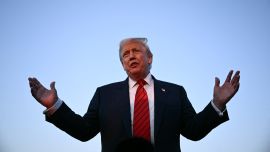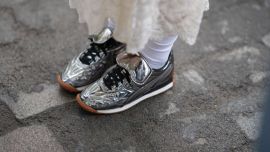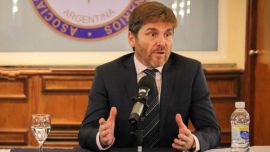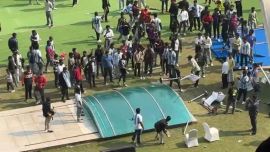European Union officials said Monday they were weighing new sanctions targeting Moscow in response to alleged atrocities against Ukrainian civilians by Russian forces that sparked a wave of international outrage.
Despite Russian denials of responsibility, condemnation was swift, with Western leaders, NATO and the UN all voicing horror at images of dead bodies in Bucha, northwest of Kyiv, and elsewhere.
Local authorities said they had been forced to dig communal graves to bury the dead accumulating in the streets, including one in Bucha found with his hands bound behind his back.
Ukraine's President Volodymyr Zelensky called Russian troops "murderers, torturers, rapists, looters" and warned in his nightly video message that "concentrated evil has come to our land."
EU foreign policy chief Josep Borrell said the bloc was urgently discussing a new round of sanctions as it condemned "atrocities" reported in Ukrainian towns that have been occupied by troops sent in by Russian President Vladimir Putin five weeks ago.
The proposals, which French President Emmanuel Macron said could target Russia's oil and coal sectors, could be discussed by foreign ministers on the sidelines of a NATO meeting on Wednesday and Thursday, or at their regular meeting early next week, an EU official told AFP.
Borrell also offered EU assistance in documenting evidence of the alleged atrocities, and Zelensky said he had created a special body to investigate.
The scale of the killings is still being pieced together, but Ukrainian prosecutor general Iryna Venediktova said 410 civilian bodies had been recovered so far.
And Bucha's mayor Anatoly Fedoruk told AFP that 280 bodies were placed in mass graves because it was impossible to bury them in cemeteries still within firing range of Russian forces.
Satellite imagery firm Maxar released pictures it said showed a mass grave located in the grounds of a church in the town.
Municipal worker Serhii Kaplychnyi told AFP that Russian troops initially refused to allow residents to bury the dead in Bucha.
"They said while it was cold to let them lie there." Eventually, they were able to retrieve the bodies, he said. "We dug a mass grave with a tractor and buried everyone."
AFP reporters in the town saw at least 20 bodies, all in civilian clothing, strewn across a single street.
'Clear indications of war crimes'
Zelensky's spokesman, Sergiy Nikiforov, said the scene in Bucha "looks exactly like war crimes."
Moscow rejected the accusations and suggested the images of corpses were "fakes" while calling for a UN Security Council meeting on what its deputy ambassador to the body called a "heinous provocation of Ukrainian radicals in Bucha."
"We categorically reject all allegations," Kremlin spokesman Dmitry Peskov told journalists.
But Macron said he was in favour of fresh sanctions since "there are very clear indications of war crimes. It was the Russian army that was in Bucha," he told France Inter radio.
In Germany, Chancellor Olaf Scholz's defence minister raised the possibility of an end to gas imports.
"President Putin and his supporters will feel the consequences," Scholz said.
Prime Minister Mateusz Morawiecki of Poland, whose country has welcomed millions of Ukrainians fleeing the violence, called for an international investigation into what he termed a "genocide."
'Even worse things'
Zelensky warned that the worst could be yet to come as Moscow refocuses its attention on the south and east of the country, in a bid to create a land link between occupied Crimea and the Russian-backed separatist statelets of Donetsk and Lugansk.
"Russian troops still control the occupied areas of other regions, and after the expulsion of the occupiers, even worse things could be found there, even more deaths and tortures," he said.
Eight people were killed and 34 wounded in Russian attacks on two towns in southern Ukraine on Sunday, prosecutors in Kyiv said.
Europe's worst conflict in decades, sparked by Russia's invasion on February 24, has already killed 20,000 people, according to Ukrainian estimates.
Nearly 4.2 million Ukrainians have fled the country, with almost 40,000 pouring into neighbouring countries in the last 24 hours alone, the UN refugee agency said.
In the eastern city of Kramatorsk, women, children and elderly people were boarding trains to flee the Donbas region.
"The rumour is that something terrible is coming," said Svetlana, a volunteer organising the crowd on the station platform.
'Intense, indiscriminate'
Russia has redoubled its efforts in Ukraine's south and east, including carrying out several strikes Sunday on the strategic Black Sea port of Odessa, which Moscow said targeted an oil refinery and fuel depots.
"We were woken up by the first explosion, then we saw a flash in the sky, then another, then another. I lost count," a 22-year-old resident, Mykola, told AFP.
Britain's defence ministry said recent Russian air activity had been focused on southeastern Ukraine, adding that heavy fighting was continuing in the devastated and besieged southern city of Mariupol.
"The city continues to be subject to intense, indiscriminate strikes," the ministry said in an update on Twitter.
The UN's top humanitarian envoy Martin Griffiths is expected in Kyiv soon after arriving in Moscow on Sunday in an attempt to halt the fighting.
And peace talks are scheduled to resume by video on Monday, though Russia's chief negotiator Vladimir Medinsky said it was too early for a top-level meeting between Zelensky and Putin.
He said Kyiv had become "more realistic" in its approach to issues related to the neutral and non-nuclear status of Ukraine, but a draft agreement for submission to a summit meeting was not ready.
related news
by Joe Stenson & Selim Saheb Ettaba, AFP






















Comments